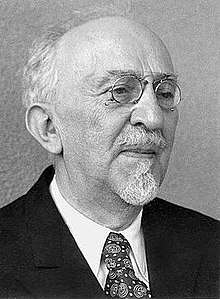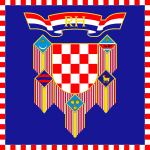Vladimir Nazor
Vladimir Nazor (30 May 1876 – 19 June 1949) was a Croatian poet and politician who served as the first President of the Presidium of the Croatian Parliament (Croatian head of state), and first Speaker of the Croatian Parliament.
Vladimir Nazor | |
|---|---|
 | |
| President of the ZAVNOH[a] | |
| In office 13 June 1943 – 21 August 1945 | |
| Preceded by | Office established |
| Succeeded by | Himself (as Speaker of Parliament) |
| 1st Speaker of the Croatian Parliament | |
| In office 21 July 1945 – 19 June 1949 | |
| Prime Minister | Pavle Gregorić (as Minister for Croatia) Vladimir Bakarić |
| Preceded by | Himself (as President of the ZAVNOH) |
| Succeeded by | Karlo Mrazović |
| President of the Presidium of the Croatian Parliament[b] | |
| In office 26 February 1946 – 19 June 1949 | |
| Prime Minister | Vladimir Bakarić |
| Preceded by | Himself (as Speaker of Parliament) |
| Succeeded by | Karlo-Gašpar Mrazović |
| Personal details | |
| Born | 30 May 1876 Postira, Dalmatia, Austria-Hungary |
| Died | 19 June 1949 (aged 73) Zagreb, Croatia, Yugoslavia |
| Nationality | Croat |
| Political party | Unitary National Liberation Front (1942–45) National Front (1945–49) |
| Alma mater | University of Zagreb University of Graz |
| ^a The President of the ZAVNOH (the wartime deliberative council) formally held the position of head of state. ^b The President of the Presidium of the Parliament was the office of the head of state, the Speaker of Parliament was a separate office. | |
Nazor began his political career as the head of the State Anti-fascist Council for the National Liberation of Croatia (ZAVNOH), the provisional Croatian World War II deliberative assembly, moving on to head the first post-war Croatian National Parliament (Narodni Sabor). In that post, he was by law concurrently the first (non-monarchical) head of state of Croatia in general, and the de facto first head of state of the current Croatian republic. His position carried little real political power, which was instead invested in the office of the Prime Minister and (informally) with the Secretary of the Communist Party of Croatia.
Nazor is however most remembered as a well-known poet, writer, translator, and humanist. Although he was not an active politician until 1941, he had a significant political influence through ethical aspects of his work during prewar Kingdom of Yugoslavia.
Early career
Nazor's early work paralleled the rise of the Young Croatian literary movement. He acquired much literary popularity in Croatia writing about folk legends and stories. The tale Big Joseph (Veli Jože) (1908) is still popular: it features a helpful and kind hearted giant named Jože, living in the area around the town of Motovun (Inner Istria). His verses in Hrvatski kraljevi (Croatian Kings) (1912) established him as the great patriot poet in Croatia. Istrian Tales (Istarske priče) (1913) revealed his storytelling skill and mastery. By illuminating the personality of the South Slavs through tales of Croatia, he contributed a great deal in creating the Yugoslav national consciousness.
Nazor supported the opposition alliance led by Vladko Maček in the 1938 Yugoslavian election.[1] During World War II, on 30 December 1941, Nazor became a member of the Croatian Academy of Sciences and Arts by government decree,[2] but in 1942 he escaped from Zagreb with poet Ivan Goran Kovačić in a boat across the river Kupa, that was sublimed in poem The Boat on the Kupa (Čamac na Kupi) and joined the Partisans. However, there is also a different story related to Nazor's alleged escape. According to the Croatian writer and politician Nedjeljko Mihanović (citing a testimony from Nazor's sister), Nazor - who at the time was old and had health issues - did not escape on his own will but was abducted by communist agents for propaganda purposes and later forced to collaborate with the new government[3]. Nazor became one of Josip Broz Tito's closest associates and the President of Croatia's World War II assembly, the ZAVNOH. After the war, he became the first president of the People's Republic of Croatia's Parliament (President of the Presidium of the People's Assembly), and thus the first head-of-state of the modern Croatian state in the Federal People's Republic of Yugoslavia. He went on to write a war diary With Partisans (S partizanima) (1943–1945). Nazor's opus after WWII mostly consisted of works strongly supportive of Tito's communist regime. His hagiographic poem Titov Naprijed - Tito's Forward - was famously memorized by generations of schoolchildren throughout Yugoslavia well into the 80s. Other poems like Drug Tito (Comrade Tito), Naš vođa (Our Leader), Uz Maršala Tita (With Mashal Tito) and many others had a similar socialist realism style bolstering Tito's cult of personality. However, it is a matter of debate whether Nazor really became a fervent communist or supported the regime mostly out of fear and opportunism. Reflecting on his position under the communist government in his handwritten diary Večernje bilješke (1945) Nazor notes "They gave me a lot of honor but no power!" ("Doduše, dodijeliše mi čast, ali ne i vlast!").
As a poet
Nazor was a very productive author. He was the master of prose, but his highest achievements are in lyric poetry. One of his main prose works is the extensive novel Loda the Shepherd (Pastir Loda) (1938). The work describes the history of his native island of Brač as told by Loda, a faun, one of the last of that kind on the island.
In poetry Nazor's creative way began from metaphysical transcendental philosophy and arrived to materialistic revolutionary action, to rational scheme and harmonic larpourlartistic crystal structure and interior protest against artistic verbalizing in Futurism, Dadaism, Expressionism and Surrealism as well as instructive didactics of socialist realism. Therefore, his opus comprises a plenty of style tendencies, from neoclassical to surrealistic and despite its heterogeneity, in essence it belongs to Symbolism. Nazor's poems are rather difficult for reading, due to subjecting contents to form – especially in sonnets, rhime and rhythm forcing, vowels shortening for adjusting the number of syllables and progressing the sentence to the next verse as well as use of academic, atypical, rare and archaic words.
Nazor wrote over 500 poems. His poetry implicates that art is aesthetically stronger than reality, for art reflects the essence of real world. Early phase of Nazor's poetry work is mostly object of scholars' research now, but Galérien's Poeme (Galiotova pesan) from that time (1903), describing suffering and sadness of a galley slave, attains universal meanining as condemnation of oppressing at all and still stands as one of the most expressive disapproval of slavery.
Nazor probably reached the highest scope in poems of so-called pagan phase, published in books of verse Lyrics (Lirika) (1910) and New Poems (Nove pjesme) (1913). Passionately ecstatic, these poems comprise symbols of life, its eternal fertility, pantheistic metamorphoses of nature and sensual affirmation of love; life prevails for life itself, so life is taken in its whole versatility. Vitalistic view of life and fascination by countryside – Cypress (Čempres), Dionysian Poems (Dionizijske pjesme), Cicada (Cvrčak) and Olive (Maslina), as well as contemplative experience and spiritualizing of natural appearances – Turris eburnea, Notturno, Forest Sleeps (Šuma spava), Trunk (Stablo) and Spider (Pauk), dominate in the heights of that phase, and these are the heights of Nazor's poetry at all. Poems Cicada, Olive, Notturno and Forest Sleeps belong to the top of the World poetry.
Vladimir Nazor spoke several languages and translated from Italian (Dante – Divina Commedia, Giosuè Carducci, Giovanni Pascoli, Gabriele d'Annunzio), German (Goethe, Heine), French (Hugo, Alfred de Musset) and English (Shakespeare).
Nazor was buried in Mirogoj Cemetery.[4] Since 1959, Croatia has named a state award for artistic achievement the Vladimir Nazor Award. In 2008, a total of 306 streets in Croatia were named after Nazor, making him the second most common person eponym of streets in the country.[5]
Works
| Wikisource has original works written by or about: Vladimir Nazor |
- List of Nazor's work on Croatian Wikipedia
- Na vrhu jezika i pera, Croatian Publishing and Bibliographic Institute, 1942
His works have been translated into following languages (incomplete list):
- Italian
- Hungarian
- Slovenian
- German
References
| Wikimedia Commons has media related to Vladimir Nazor. |
- Vladimir Nazor Archived 23 March 2010 at the Wayback Machine, Croatian Radiotelevision
- Tko je tko u NDH, "Vladimir Nazor". Minerva. Zagreb, 1997
- Božidar Nagy, Svjedočanstvo dr. Nedjeljka Mihanovića: Partizani su na silu oteli Vladimira Nazora, Glas Koncila, no. 16 (2078), 20. april 2014., in Croatian, as cited by HRSvijet.net, accessed 8. august 2020.
- Vladimir Nazor at Gradska Groblje Archived 18 July 2011 at the Wayback Machine
- Letica, Slaven (29 November 2008). Bach, Nenad (ed.). "If Streets Could Talk. Kad bi ulice imale dar govora". Croatian World Network. ISSN 1847-3911. Retrieved 31 December 2014.
| Political offices | ||
|---|---|---|
| New title | President of the ZAVNOH 1943–1945 |
Succeeded by Himself as Speaker of Parliament |
| Preceded by Himself as President of the ZAVNOH |
Speaker of the Croatian Parliament 1945–1946 |
Succeeded by Zlatan Sremec |
| Preceded by Himself as Speaker of Parliament |
President of the Presidium of the Croatian Parliament 1946–1949 |
Succeeded by Karlo-Gašpar Mrazović |
